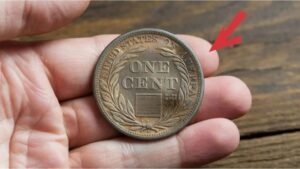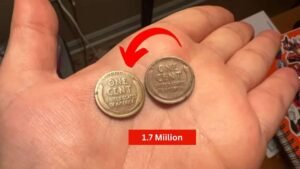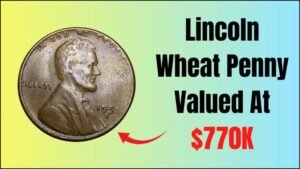Ever wondered if that dusty penny in your wallet or old jar could be worth a fortune? American rare pennies are turning everyday folks into instant millionaires, with some discoveries hitting $1.5 million at auctions. These tiny one-cent coins, often overlooked in pocket change, pack huge value thanks to factory mistakes, low production runs, and ties to big historical moments like World War II. From the legendary 1943 copper penny to the doubled-die wonders, these gems blend history with high stakes.
The Quick History of American Pennies
American pennies have been a part of daily life since 1793, but the ones we hunt today started with the Lincoln cent in 1909. Honoring President Abraham Lincoln, it was the first U.S. coin to show a real person’s face instead of symbols like eagles. Early designs featured wheat stalks on the back, symbolizing America’s farming roots, before switching to the Lincoln Memorial in 1959.
Billions were minted at three main spots: Philadelphia (no mark), Denver (“D”), and San Francisco (“S”). They powered small buys like candy or newspapers through tough times, including the Great Depression and World War II. During the war, copper shortages led to steel pennies in 1943 – but a few copper slips created instant rarities. Today, these coins aren’t just money; they’re time capsules with stories that collectors chase for fun and profit.
Why Rare Pennies Excite Collectors in 2025
Beyond cash, these pennies connect us to history – like wartime flubs or design tweaks. With economic ups and downs, their steady value draws investors. In 2025, online hunts and apps make spotting them easier, turning a hobby into a smart side gig.
What Makes an American Penny Super Valuable?
Most pennies are worth one cent, but rarities explode due to slip-ups at the mint, tiny batches made, or top-notch condition (no scratches or wear). Mint errors like double strikes – where parts print twice – top the list, as do low-run years during hard times. Historical links, like WWII metal switches, add appeal too. Condition rules: Shiny “mint state” ones fetch way more than pocket-worn examples.
Pro grading from groups like NGC or PCGS confirms authenticity and boosts prices. In 2025 auctions, demand is hot, with values up 15-20% from last year.
Top 7 Rare American Pennies to Know
Here’s a simple table of standout rarities, pulled from recent sales. It covers the year, special quirk, record high price, and value range – your fast guide for checking finds.
| Year & Type | Special Quirk | Record Auction Price | Value Range (Good Condition) |
|---|---|---|---|
| 1943 Copper | Copper blank in steel year | $1.7 Million | $100,000–$1.7 Million |
| 1955 Double Die | Double strike on front letters | $1.25 Million | $50,000–$1.25 Million |
| 1914-D Lincoln | Super low Denver production | $1 Million | $50,000–$1 Million |
| 1992 Close AM | “AMERICA” letters too close | $250,000 | $150,000–$250,000 |
| 1970-S Doubled Die | Doubled reverse design | $125,000 | $60,000–$125,000 |
| 1922 No D | Missing Denver mark | $350,000 | $300,000–$350,000 |
| 1999 Wide AM | “AMERICA” letters too far apart | $100,000 | $75,000–$100,000 |
Hunt these dates first – the 1943 copper is the ultimate “wow” find.
Simple Steps to Spot a Rare Penny
No fancy gear needed – grab a magnifying glass or phone zoom and start checking. Focus on the date, back design, and any odd looks.
- Eye the Date and Mark: Below the year on front – no mark for Philly, “D” Denver, “S” San Francisco. Target 1943, 1955, or 1914-D.
- Hunt Errors: Look for fuzzy doubles on letters (1955 style) or missing marks (1922). Close or wide spacing in words? Big clue.
- Check Metal and Color: 1943 should be steel-gray; reddish copper means jackpot. Weigh it – copper’s 3.11 grams, steel lighter.
- Assess Shape: Worn smooth? Basic value. Crisp and shiny? Premium.
- Quick Compare: Snap photos and match to online guides like PCGS for free hints.
If it matches, don’t spend it – head to a coin shop for a no-cost pro look.
Easy Breakdown of Penny Condition
Condition scores from 1 (trashed) to 70 (perfect) drive prices. This table uses the 1955 Double Die as an example, showing looks and value shifts.
| Score Range | Plain Name | What It Looks Like | Value Example (1955 Double Die) |
|---|---|---|---|
| 1–3 | Worn Out | Flat, details blurred | $50,000 base |
| 4–15 | Fair | Readable but scratched | $60,000–$100,000 |
| 16–35 | Good | Clear lines, light wear | $100,000–$200,000 |
| 36–49 | Very Fine | Sharp, minor spots | $200,000–$500,000 |
| 50–70 | Mint Fresh | Shiny, no rub | $500,000–$1.25 Million+ |
Get certified by NGC or PCGS ($20–$50) to prove it’s real and amp up sales.
Where to Dig for Rare Pennies in 2025
These treasures hide in plain sight! Raid home spots like piggy banks, old purses, or grandma’s drawer. Buy penny rolls from banks (50 for 50 cents) for easy hunts. Flea markets, yard sales, and estate sales overflow with unchecked coins from unaware sellers.
Real wins: A 2025 roll hunter scored a 1992 Close AM worth $200,000. Another attic find – a 1943 copper – hit $500,000. With decluttering trends, 2025’s prime time.
Tips for Penny Newbies
Join free groups like the Penny Collectors Forum online. Keep a log of finds. Be patient – scan lots for one gem. Sell via eBay or auctions for max cash.
Plain Talk for Coin Words
Coin terms trip folks up. This table swaps hard ones for simple.
| Tough Term | Easy Explanation |
|---|---|
| Obverse | Front side (usually with a face) |
| Reverse | Back side of the coin |
| Mintage | How many coins made that year |
| Doubled Die | Factory slip making parts print twice |
| Planchet | Blank metal disc before stamping |
| Numismatist | Person who collects or studies coins |
FAQ: Your Rare Penny Questions Answered
Q: What’s the priciest American penny?
A: The 1943 copper – up to $1.7 million for its WWII error.
Q: Can rare pennies still circulate?
A: Yes, though slim odds – old jars or bank rolls boost chances.
Q: Should I clean a suspect penny?
A: Never – it dulls the shine and cuts value in half.
Q: How do I sell a find?
A: Get it graded by NGC/PCGS, then list on eBay or at auctions.
Q: Why get a penny certified?
A: It proves it’s real and boosts price by showing condition.
Conclusion: Start Your Rare Penny Hunt and Strike Gold Today
American rare pennies, from the $1.7 million 1943 copper to doubled-die delights like the 1955, prove fortune favors the finder. We’ve covered their history, value drivers like errors and condition, spotting steps, and hunt tips – all in plain words to launch your adventure. In 2025’s collector boom, one overlooked cent could fund dreams. Grab that change jar or bank roll now – a quick scan might reveal a winner. Verify with pros to stay safe. Hunting these coins mixes thrill, smarts, and history – ideal for anyone chasing easy wins. Happy discovering; your next penny could be priceless!




